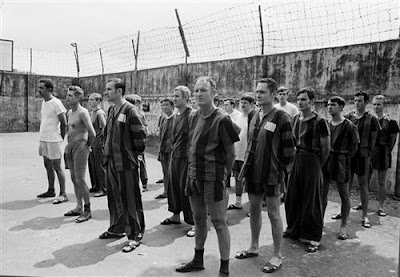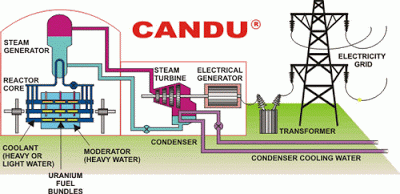From the big scrapbook of time, here is a look at Canada in
1973-
January 25: There are headaches aplenty for residents on the
northern side of Vancouver Island. Destined to dock in Squamish, the oil tanker
Irish Stardust runs aground, spilling
its cargo into Alert Bay.
 |
| American soldiers, now Prisoners of War, are held captive by the North Vietnamese in a Hanoi prison. |
January 27: Governor General Roland Michner is at the
airport to bid farewell and good luck to a group of fifteen civilians and 130
soldiers as they leave Montreal for Saigon. The Canadians are part of the
International Control and Supervision Team. Along with Hungarians, Indonesians
and Poles, they will arrange prisoner exchanges and attempt to broker
cease-fire arrangements between the Americans and the Viet Cong.
February 1: Louis Rasminsky steps down as Governor of the
Bank of Canada. Gerald Bouey will step into his shoes and set national
fiscal policy for the next fourteen years.
 |
| The CN tower will cost the Canadian National Railway $63 million. |
February 5: Construction begins on the CN Tower. When it is
completed two years from now, it will be the tallest freestanding structure in
the world. The tower is sorely needed as a communications centre; it is
difficult to receive broadcast signals in and around Metro Toronto.
February 13: Published last year, the Gendron Report is
released to the public. The controversial document recommends that French be
made the only official language in Quebec in order to guarantee Francophones a
place in 20th Century North America.
 |
| Lester B. Pearson was the nation's 14th Prime Minister. A spy in World War Two, he won the Nobel Peace Prize in 1957. |
February 15: The Lester B. Pearson College of the Pacific is
inaugurated in Victoria, BC. The unique school will be one of ten United World
Colleges on five continents that brings together as many as 200 students from
80 different countries to promote international harmony and understanding.
February 28: It is a boy for Carl and Bonnie Lindros of
London, Ontario. Eric will grow up to be 190 centimetres tall. The “Big E” will
put on his skates for the Philadelphia Flyers and the New York Rangers.
March 12: Toronto Mayor David Crombie is at the Juno Awards
and presents Stompin’ Tom Connors with a Juno for best country male vocalist.
Anne Murray is honoured with a Juno for best female vocalist and Terry Jacks
wins a Juno for best male vocalist.
March 15: Members of Local 5457 of the United Steelworkers
of America reject the latest offer from The American Smelting and Refining
Company—ASARCO—in Buchans, Newfoundland. The work stoppage is long and bitter
and will not be resolved until a better contract is finally signed on October 3rd.
March 22: St. Lawrence Seaway Authority strikes a deal with
the Mohawks living in Kahnawake, Quebec. The First Nations people will be
given $1.5 million and 321.7 hectares of land in compensation for the 526
hectares unilaterally expropriated in 1955.
 |
| Don Messer's Jubilee was broadcast on radio and then television from Charlottetown, PEI on CBC affiliate CFCY. |
March 26: Folk music legend Donald Charles “Don” Messer is
dead of a heart attack in Halifax at the age of 62. The star of Don Messer’s Jubilee was heard on the
CBC from 1944 until it moved to CBC-TV in 1959. The programme was second only
in popularity to “Hockey Night in Canada.”
March 28: Heritage Canada is founded. The non-profit
organization is charged with the responsibility of identifying and preserving
historical sites of national importance.
 |
| This satellite is one of the Anik family. Anik means 'brother' in Inuttitut, the language of the Inuit people. |
April 2: The Anik A-2 satellite is launched. Once in orbit,
it allows Arctic communities to receive live colour television broadcasts from
southern Canada and phone service, too. Canada is the first country in the
world to make use of satellites for domestic communication.
April 29: Flooding along the St. John River will cost
residents of New Brunswick more than $25 million.
May 5: New Brunswick jockey, Ron Turcotte, rides Secretariat
to win the Kentucky Derby in a record time of 1:59. The pair will go on to take
the Triple Crown—the first time that has happened in a quarter century.
May 10: In a rematch of the 1971 playoffs, Montreal bests the Chicago Blackhawks after six
games to take home the Stanley Cup.
May 18: Prime
Minister John George Diefenbaker’s family home in Prince Albert is donated to
the University of Saskatchewan. Diefenbaker House will become a museum and be home
to the Diefenbaker Archives.
 |
| The 1973 Oldsmobile Cutlass is takes Ninth Spot in automobile sales this year. GM publicity says the intermediate-sized car features 'Collonade Styling.' |
May 29: The Canadian contingent of the International Control
and Supervision Team will withdraw from Viet Nam because the committee is not
impartial.
June 5: Ottawa declares amnesty for some 50,000 illegal
immigrants. They have until October 15 to apply for residency.
June 8: The New Brunswick Society of Acadians is
established. It will enrich the lives of all Canadians and honour the heritage of some 34,000 Francophone
New Brunswickers.
June 28: Her Majesty, Queen Elizabeth II, is in
Niagara-on-the-Lake to participate in the inauguration of the Shaw Festival
Theatre.
July 1:Long live the glass bottle! Prince Edward Island bans the sale of beer in tin
cans. Soft drinks sold in non-refillable plastic will be banned in 1974 and
soft drink cans will be banned in 1984. The law will be repealed in 2008.
July 12: The Supreme Court of Canada rules that the Indian
Act of 1876 is unconstitutional because it infringes on the human rights of
Aboriginal Canadians.
July 18: Super model Christine Demeter is brutally murdered.
Police find her battered body in the family home in Mississauga, Ontario. The
police investigation quickly points to her husband, one of the wealthiest men
in the world. The lurid details of the slaying will be revealed at a trial that
will grip the entire nation. Christine’s sensational death will be the subject of
numerous books and movies for years to come.
July 25: Louis St. Laurent dies in Quebec City. He is 91.
St. Laurent served as the nation’s 12th Prime Minister from 1948 until the
Liberals were defeated by Deifenbaker’s Tories in the general election of 1957.
Under St. Laurent’s guidance, Canada joined NATO and his Minister of External
Affairs, Mike Pearson, won the Nobel Peace Prize in 1956 for Canada’s brilliant
solution to the Suez Canal Crisis.
“Uncle Louis” will be interred in his hometown of Compton, Quebec.
August 10: A tornado is spotted in Upper Garry Lake,
NWT--now Nunavut. It is the most northerly twister recorded in this
country.
August 30: Railway workers are on strike. Some 200 of them
have occupied the Centre Block of the Parliament building to protest forced
arbitration.
August 31: Scott Niedermayer is born in Edmonton. He will
grow up to play hockey for the New Jersey Devils.
October 5: Jules Leger is appointed to be the 21st Governor
General of Canada. The career diplomat is currently Ambassador to Belgium. His
brother is Cardinal Leger, the Archbishop of Montreal.
October 17: The Organization of Petroleum Exporting States
votes to cut production of oil by 5 percent and to hike the price by 70 percent
to protest the American backing of Israel during the Yom Kippur War. This is
good news for Alberta but not so good for other provinces. The OPEC hike will
prompt the Trudeau government to set up Petro-Canada as a Crown corporation.
November 1: Established in 1911, Waterloo Lutheran
University gets a new name. Henceforth the institution of higher learning will
be known as Sir Wilfred Laurier University.
November 13: The battle may be won but the war is not over. A Montreal jury refuses to find abortion rights activist
Dr. Henry Morgentaler guilty of performing an illegal abortion because the law is perceived to be unjust.
December 4: Alfred Carl Fuller is dead at the age of 88.
Born and raised in Welsford, Kings County, Nova Scotia, the budding
entrepreneur moved to the United States when he was 18. He founded the Fuller
Brush Company, one of the most successful door-to-door businesses in the world.
He will be buried in
the Pleasant Valley Cemetery in Somerset, Nova Scotia. The millionaire’s
home in Yarmouth, Nova Scotia will become a museum.
December 7: The government sells a CANDU nuclear reactor to
South Korea. It is the Atomic Energy Commission’s first international sale. It
won the bid because the system is relatively inexpensive, using un-enriched
uranium.
 |
| The Royal Canadian Air Farce will win many awards for their eight comedy albums. |
December 9: Folks who tune their radio dials to the CBC are treated to the
antics of a wacky new comedy troupe, The Royal Canadian Air Farce. Their weekly
radio show is highly popular and will become a staple on CBC Television in
years to come. In 2008, the show will
retire after 35 years of tickling our funny bones.
December 31: Automakers close out the year with sales
reports. The Top Ten sellers for the calendar year are Chevrolet (full size),
Toyota, Datsun, Ford (full size), Plymouth Valiant, Ford Torino, Dodge Dart,
Chevrolet Vega, Oldsmobile Cutlass and Volkswagen.
Visit my old car website at: The Oilspot Eh!
All rights reserved.






























No comments:
Post a Comment